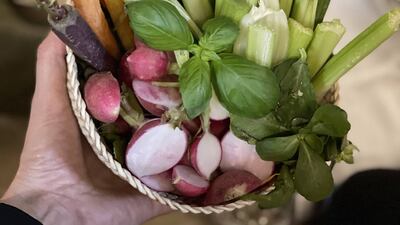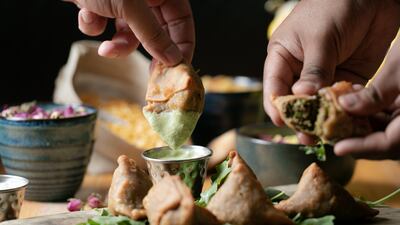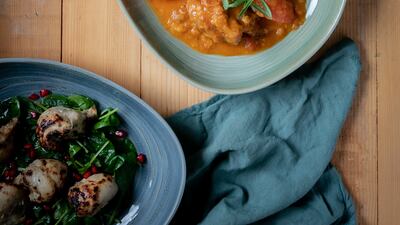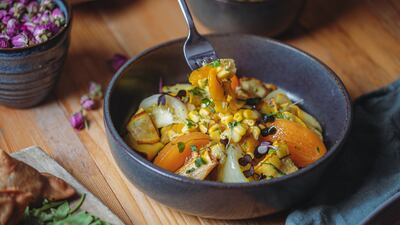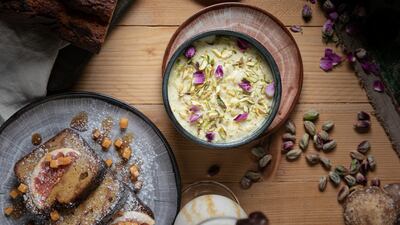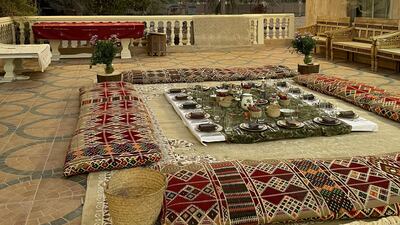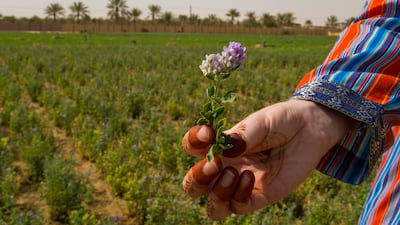While Expo 2020 Dubai will launch a globe-trotting gastronomic experience when it opens on Friday, one of the more exciting food offerings should make UAE residents feel right at home.
Alif Cafe by farm2table is the sustainable restaurant venture launched by Humaid Alremethi and Jessica Queitsch, in partnership with Media One Hotel.
Opening at the Mobility Pavilion on Friday, the restaurant by the husband and wife team features a menu with disparate influences, all cooked with produce grown by local artisanal farmers.

“The UAE has such a beautiful versatility when it comes to local ingredients and is proof that sustainable eating can be a lifestyle for all,” Queitsch tells The National. “There’s been a bit of an underground wave starting in the UAE, especially among local farmers, who have been experimenting with growing different plants and stepping out of their comfort zone.
“My husband and I have always had a huge passion for agriculture and growing things with sustainability in mind."
The German-Canadian chef, who has worked in many parts of the world, including the UK and Japan, says she wanted to find an outlet that combined her love for cooking with the interest in agriculture she shares with her Emirati husband. The couple want to showcase the range of produce that is grown in the UAE, and she intends to be the bridge between artisanal farms and the global community that will be visiting the Expo.

“We hope to spotlight local artisanal farmers with this concept that is ‘born at Expo’,” she says.
The couple invited The National for a preview dinner at their family farm. Located in Sweihan, a town 70 kilometres north-west of the city of Al Ain, the farm is one of several owned by Alremethi’s family. It is a walled-off expanse lush with vegetable fields and palm trees. Kittens scamper about the potted flowers and cacti, a pair of dogs stand on guard and goats can be heard bleating nearby.
Alremethi takes us on a tour of the grounds, explaining that his family has been keeping farms for a century, with his great-grandfather importing palm trees from Iraq, Saudi Arabia and Kuwait. “They’re heirlooms,” he says of the farms. “They’re special for us.”

The farm we are standing in is at least a decade old, and though it is hard to imagine the landscape without the fields of alfalfa leaves and looming palm trees, Alremethi says the land was completely bare when his family received it.
“We took date palms from our old palm trees in our farm in Al Ain Oasis and planted them here. We had to start from scratch.”
It is clear that Alremethi feels a responsibility towards these farms, not only to tend to them but also expand them, to “do better tomorrow”.

He takes us to the edge of the farm, beyond which the land has been flattened and topped with a layer of nutrient-rich soil from Al Ain. “Iron, metals, selenium, calcium; the soil contains many different kinds of minerals that are crucial to our bodies,” he says. “This is important. If you grow something from a mineral-depleted earth, you’re going to get a crop that is tasteless, scentless and with very little nutrients.”
We make our way to the dinner table, an open-air floor-seating arrangement. Dishes and cutlery are already set, and folded linen napkins are decorated with a single fresh zaatar sprout. The set-up offers a touch of fine dining with the intimacy of an Emirati family get-together.

Our hosts point to the bread baskets in front of us – they're jam-packed with slices of focaccia. Some are a sombre brown, made with locally produced wheat. Slightly salty, they are both chewy and crisp. The others have a faint sweetness and are red in hue thanks to added beetroot.
Fresh vegetables are then brought out: purple and orange carrots, spring onions, celery and radishes stuffed in khous baskets woven from palm trees.
Then comes the yellow salad, a medley of yellow tomatoes, corn and courgette, all grown in the fields around us. The salad is bursting with distinct textures and flavours – its freshness reprised with every bite.

Beef samosas are then laid out on wooden receptacles. Bulbous and golden, the fried pastry’s crunchy exterior contrasts perfectly with the tenderness of the beef filling.
Plates of Afghan chainaki are brought out in steamy bowls. The lamb slides off the bone and a flurry of praising murmurs later, the table falls silent as we savour the taste of the meat and stew.
“We’ve been keeping animals on the farm for five or six years now,” Saeed, a cousin of Alremethi’s, who plays an active role in managing the farm, says. Elaborating on the secret of the meat’s tenderness, he says it’s all a matter of how the animals are treated and fed. “The meat doesn’t have any of that bad smell of the sheep and that’s because of the food we give it. We also make sure to keep their environment clean. If you go to the market, you’ll find the lamb and mutton has a smell. Because of the size of their production, they can’t control it.”

Finally, the dessert – a rose and pistachio rice pudding with a palette of flavours and a subtle sweetness. As our spoons clank against the glass bottom of our pudding bowls, Queitsch tells us the inspiration for her menu, saying it came about as she was thinking about the relationship between food and mobility, the theme of the pavilion where Alif Cafe is located.
“The Silk Road was an inspiration,” she says. She notes how key ingredients such as wheat, rice, coffee and spices travelled via the Silk Road – a network of trade routes connecting China and the Far East with the Middle East and Europe – and went on to influence worldwide cuisine. While the fusion in Alif Cafe’s menu – set to change regularly by offering seasonal dishes – may speak of the ambulant nature of culinary practices and tastes, the eatery will also host a variety of presentations about food’s mobility.
Alif Cafe will also hold talks about how to grow your own food and the importance of making conscious choices when eating.
“I hope to inspire guests of all ages to question where their food comes from,” Queitsch says.
